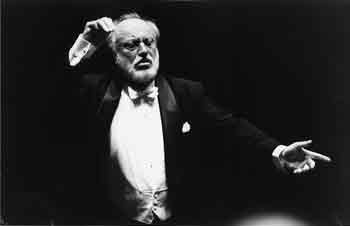 Washington Performing Arts Society brought the Orchestre National de France to the Kennedy Center Concert Hall on Monday night, for its first visit to Washington in 17 years. The orchestra's current U.S. tour is being offered as a valedictory of sorts for departing Music Director Kurt Masur, who has stepped down from several podiums in the last few years. Masur's health issues sadly have worsened visibly since his last visit here: he shuffled to and from the podium, and when his hands dropped to his side, they shook. If this concert turns out to be Masur's final appearance in Washington, then the odd program is surely the best of the possibilities offered on this tour. How welcome the chance to hear Masur conduct Bruckner instead of Tchaikovsky or Dvořák, especially since the planned Bruckner 4th of Masur's last visit (with the London Philharmonic) was replaced with Brahms. The only regret, perhaps, was not to have the Bruckner combined with Masur's Shostakovich.
Washington Performing Arts Society brought the Orchestre National de France to the Kennedy Center Concert Hall on Monday night, for its first visit to Washington in 17 years. The orchestra's current U.S. tour is being offered as a valedictory of sorts for departing Music Director Kurt Masur, who has stepped down from several podiums in the last few years. Masur's health issues sadly have worsened visibly since his last visit here: he shuffled to and from the podium, and when his hands dropped to his side, they shook. If this concert turns out to be Masur's final appearance in Washington, then the odd program is surely the best of the possibilities offered on this tour. How welcome the chance to hear Masur conduct Bruckner instead of Tchaikovsky or Dvořák, especially since the planned Bruckner 4th of Masur's last visit (with the London Philharmonic) was replaced with Brahms. The only regret, perhaps, was not to have the Bruckner combined with Masur's Shostakovich.| Bruckner 7th: NY Phil/Masur Orchestre des Champs-Elysées, Herreweghe NDRS/Wand Lucerne/Abbado |
For you Brucknerians keeping track, Masur opted not to include the disputed cymbal crash (or other percussion) in the second movement, a decision supported in no uncertain terms by Robert Haas in his edition (but opposed by Leopold Nowak). An active scherzo revealed a few woodwind intonation clashes, when they were exposed in high range in the Trio, and the movement rattled out of unity as cross-rhythms pulled the texture apart. In general, though, the ONF played with an impressive sense of ensemble and showed clear devotion to their departing director.
Anne Midgette, Masur Evokes A Golden Bruckner Memory (Washington Post, April 30) Matthew Guerrieri, A master performance, decades in the making (Boston Globe, April 30) |
The penultimate concert in the WPAS season will be this Sunday (May 4, 4 pm), a recital by violinist Itzhak Perlman and pianist Rohan DeSilva at Strathmore.
No comments:
Post a Comment